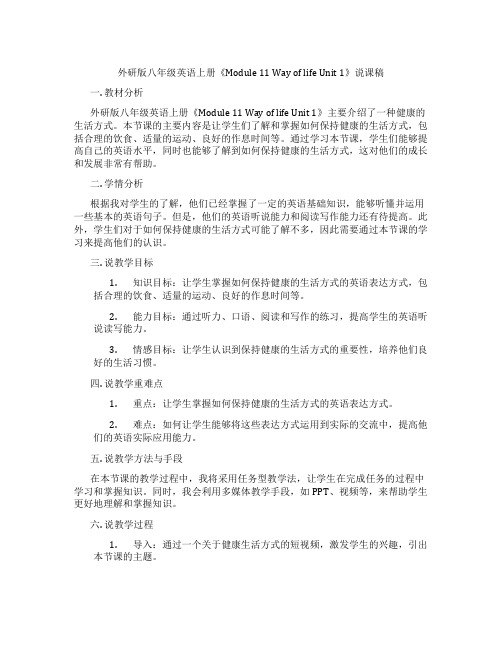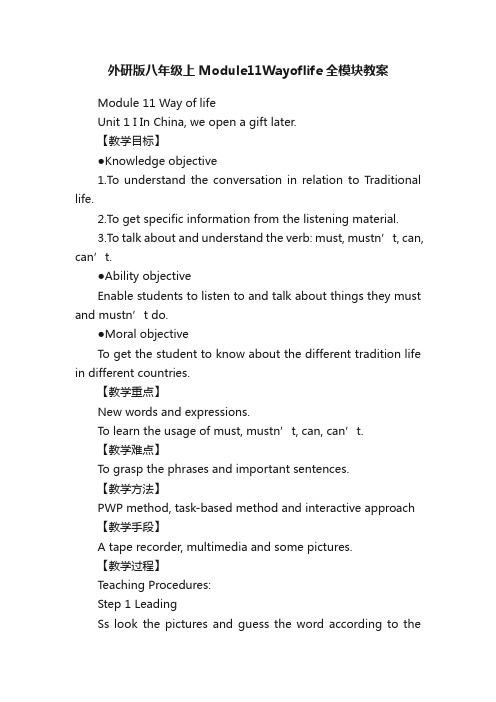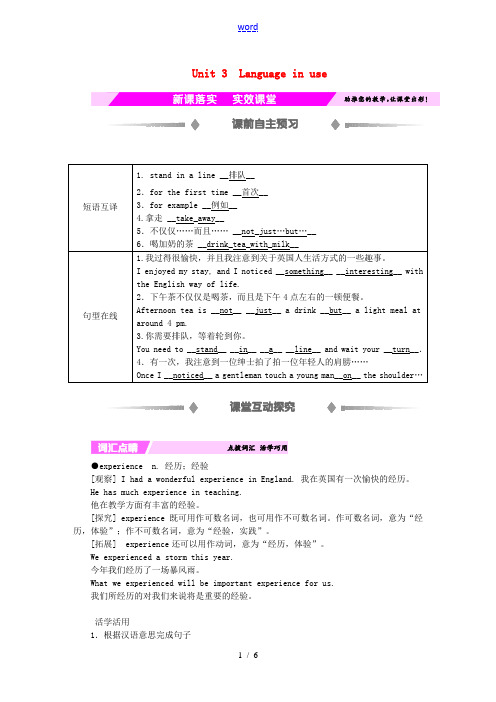2016年秋八年级英语上册 Module 11 Way of life Unit 1 In Chin
外研版英语八上《Module 11 Way of life Unit 2》教学设计2

外研版英语八上《Module 11 Way of life Unit 2》教学设计2一. 教材分析外研版英语八上《Module 11 Way of life Unit 2》主要讲述了不同国家和地区的饮食习惯和生活方式。
本课内容通过描述一个美国学生和一对英国夫妇在餐馆的对话,引入了不同国家的饮食文化差异。
教材内容丰富,包括听力、口语、阅读和写作等各个方面的练习。
本课旨在让学生能够听懂、会说、读懂关于不同国家饮食习惯和生活方式的短文,并能够运用所学知识进行交流和表达。
二. 学情分析学生在学习本课之前,已经掌握了基本的英语语法和词汇,具备一定的听说读写能力。
但是,对于一些关于生活习惯和饮食文化的表达方式可能还比较陌生。
因此,在教学过程中,需要关注学生的个体差异,充分调动学生的积极性,引导他们主动参与课堂活动。
三. 教学目标1.知识目标:–学生能够听懂、会说、读懂关于不同国家饮食习惯和生活方式的短文。
–学生能够运用所学知识进行交流和表达。
2.能力目标:–学生能够通过听力、口语、阅读和写作等实践环节,提高自己的英语应用能力。
–学生能够运用所学知识,描述和比较不同国家的饮食习惯和生活方式。
3.情感目标:–学生能够尊重和理解不同国家和地区的文化差异。
–学生能够培养良好的生活习惯,提高自己的生活质量。
四. 教学重难点•学生能够听懂、会说、读懂关于不同国家饮食习惯和生活方式的短文。
•学生能够运用所学知识进行交流和表达。
•学生对于一些关于生活习惯和饮食文化的表达方式的理解和运用。
•学生能够在实际情境中,灵活运用所学知识进行交流和表达。
五. 教学方法1.任务型教学法:通过设计各种实际的交际任务,让学生在完成任务的过程中,提高自己的英语应用能力。
2.情境教学法:通过创建真实的学习情境,让学生在特定的情境中,自然地学习和运用英语。
3.合作学习法:通过小组合作的形式,让学生互相交流、讨论,共同完成学习任务。
六. 教学准备1.教学材料:教材、多媒体课件、录音机、磁带或光盘等。
Module11WayoflifeUnit1教学课件英语八年级上册【04】

典。)玲玲:哦,谢谢。
(Lingling opens her
我很想要一本词典。贝
present and finds a
蒂:你喜欢我们就高兴。
dictionary.)
Lingling: Oh, thank you. I
really wanted one.
Tony: I noticed another 托尼:我注意到另一个
the Spring Festival month.
Now, let’s learn some language points from this dialthday, Lingling.
这是Here开头的倒装句。当
Daming: Here's your gift. here,there在句首且主语是
Betty: We're happy you like it.
Tony: I noticed another 泛指“另一个”,常用于三者
difference. In China, you 或以上中的另一个;another后
accept a gift with both 可直接跟单数名词,也可单独
hands. But in usually don't
remembered! What a
真是个惊喜!托尼:你
surprise!Tony: You can open 可以打开它!玲玲:我
it!Lingling:I don't think I 认为我现在不应该打开
should open it now. In
它。在中国,我们晚些
China, we open a gift later. 时候打开礼物。
Lingling:So what do I do? 情况下可以通用。
外研版英语八年级上册Module 11《Way of life》(Unit 2)教学设计

外研版英语八年级上册Module 11《Way of life》(Unit 2)教学设计一. 教材分析《Way of life》(Unit 2)是外研版英语八年级上册Module 11的一部分,主要介绍了不同人的生活状况。
本节课的主要内容包括一个关于不同国家人们生活状况的短文,以及相关的词汇和语法知识。
通过本节课的学习,学生可以了解不同国家人们的生活状况,提高他们的阅读理解能力,同时也可以扩展他们的词汇量和语法知识。
二. 学情分析八年级的学生已经具备了一定的英语基础,能够进行简单的英语交流。
但是,他们的阅读理解能力和词汇量还有待提高。
因此,在教学过程中,需要注重培养学生的阅读理解能力,同时也要注意扩展他们的词汇量和语法知识。
三. 教学目标1.能够理解并朗读课文,掌握课文中的主要词汇和语法知识。
2.能够通过阅读课文,了解不同国家人们的生活状况。
3.能够运用所学的词汇和语法知识,进行简单的英语交流。
四. 教学重难点1.词汇和语法知识的掌握。
2.阅读理解能力的培养。
五. 教学方法1.任务型教学法:通过设定各种任务,让学生在完成任务的过程中,自然地学习和掌握词汇和语法知识。
2.交际型教学法:通过模拟真实的交流场景,让学生在实际交流中,运用所学的词汇和语法知识。
3.情境教学法:通过设定各种生活情境,让学生在情境中,自然地学习和掌握词汇和语法知识。
六. 教学准备1.教材:外研版英语八年级上册Module 11《Way of life》(Unit 2)。
2.多媒体设备:电脑、投影仪等。
3.教学PPT:内容包括课文内容、词汇、语法知识等。
七. 教学过程1.导入(5分钟)通过提问方式,引导学生谈论他们所知道的不同国家人们的生活状况。
例如:“Can you tell me what the life of students in Japan is like?” “What about in the United States?” 通过这样的导入,可以激发学生的兴趣,同时也可以帮助他们回忆起已知的知识。
2016年秋八年级英语上册 Module 11 Way of life Unit 1 In Chin

Unit 1 In China, we open a gift later.Boys and girls! Do you often receive gifts? Do you open a gift immediately when you get it or later?导入二多媒体导入通过多媒体屏幕向学生展示班级里某同学过生日时的几张照片,引出本单元的学习内容,让学生了解一些有关过生日送礼物的习俗,为本单元的学习做好铺垫。
T: Class, look at these photos. What do you know from them?S1: I know it's Wang Kai's birthday.T: Then what do you know about birthday gifts in China and in the US.S2: In China, people open a gift later.S3: In the US, people open a gift immediately.…T: Good. Let's begin our new lesson: In China, we open a gift later.导入三小对话导入与学生进行有关生日及生日礼物的小对话,从而为本单元的学习打下基础。
T: Do you have a birthday party every year?S1: Yes.T: How many gifts do you usually get?S1: Many. And my friends always make gifts by themselves.T: Do you open the gifts at once or later?S1: I open the gifts…活动一教材Activities 1-2(教学目的:通过图片展示学习新词汇,为下面的学习做铺垫)(详见光盘课件)1.词汇学习:通过PPT学习本单元的新单词。
【小初高学习】八年级英语上册 Module 11 Way of life Unit 2 In Eng

Ⅱ.II.翻译短语并在对话中划出来。
1. a light meal_________________2. my experiences in England________________
3.for the first time______________4.the English way of life_______________
4.在公交车上,你一定不要挤着上车。
______________________________________________________________________________________________________________________________________________.
2.下午茶不仅仅是喝茶,也是下午四点左右的一顿便餐。
______________________________________________________________________________________________________________________________________________.
2.能够读懂有关谈论礼仪方式的篇章,并获取相关信息。
3.了解并尊重其他国家的传统习俗和生活方式,增强跨文化意识。为来中国人家中作客的外国朋友提出建议。
学习过程
备注
课前自学
Ⅰ.看音标,写单词。
1.[ɪkˈspɪriəns]2.[steɪ]3.[ˈsʌmwʌn]4.[ˈdʒentlmən]5.['ʃəʊldə]
Module 11 Way of life
课题
Module 11 Way of life
外研版八年级英语上册《Module11WayoflifeUnit1》说课稿

外研版八年级英语上册《Module 11 Way of life Unit 1》说课稿一. 教材分析外研版八年级英语上册《Module 11 Way of life Unit 1》主要介绍了一种健康的生活方式。
本节课的主要内容是让学生们了解和掌握如何保持健康的生活方式,包括合理的饮食、适量的运动、良好的作息时间等。
通过学习本节课,学生们能够提高自己的英语水平,同时也能够了解到如何保持健康的生活方式,这对他们的成长和发展非常有帮助。
二. 学情分析根据我对学生的了解,他们已经掌握了一定的英语基础知识,能够听懂并运用一些基本的英语句子。
但是,他们的英语听说能力和阅读写作能力还有待提高。
此外,学生们对于如何保持健康的生活方式可能了解不多,因此需要通过本节课的学习来提高他们的认识。
三. 说教学目标1.知识目标:让学生掌握如何保持健康的生活方式的英语表达方式,包括合理的饮食、适量的运动、良好的作息时间等。
2.能力目标:通过听力、口语、阅读和写作的练习,提高学生的英语听说读写能力。
3.情感目标:让学生认识到保持健康的生活方式的重要性,培养他们良好的生活习惯。
四. 说教学重难点1.重点:让学生掌握如何保持健康的生活方式的英语表达方式。
2.难点:如何让学生能够将这些表达方式运用到实际的交流中,提高他们的英语实际应用能力。
五. 说教学方法与手段在本节课的教学过程中,我将采用任务型教学法,让学生在完成任务的过程中学习和掌握知识。
同时,我会利用多媒体教学手段,如PPT、视频等,来帮助学生更好地理解和掌握知识。
六. 说教学过程1.导入:通过一个关于健康生活方式的短视频,激发学生的兴趣,引出本节课的主题。
2.新课呈现:通过PPT展示本节课的主要内容,让学生初步了解如何保持健康的生活方式。
3.课堂讨论:让学生分小组讨论如何保持健康的生活方式,并鼓励他们用英语表达自己的观点。
4.听力练习:让学生听一段关于健康生活方式的对话,并回答相关问题。
[配套K12]2016年秋八年级英语上册 Module 11 Way of life Unit 1
![[配套K12]2016年秋八年级英语上册 Module 11 Way of life Unit 1](https://img.taocdn.com/s3/m/2664f023650e52ea55189864.png)
Module11 Unit1(20分钟50分)Ⅰ.根据句意及首字母或汉语提示完成单词(10分)1.What a s________!I put my key here,but it has gone now.2.Although they are twins,there are many d________between them.3.T he old man gave Jack some money,but he didn’t a________.4.The soup________(尝起来)delicious.I want to have some more.5.Chinese________(传统)are quite different from the American ones.Ⅱ.单项选择(10分)1.—Must I do my homework no w,Mum?—______.You can do it tomorrow.A.No,you needn’tB.No,you mustn’tC.Yes,you needD.Yes,you must2.Th e cakes taste______.Can I have another one?A.terribleB.wellC.seriousD.nice3.______my father______my mother are teachers.A.Both;ofB.Both;andC.Neither;norD.Not only;but also4.In China,when someone______you a pr esent,you mustn’t______it immediately.A.give;openB.give;to openC.gives;openD.gives;opening5.You had better______hair tomorrow.It’s too long.A.cut youB.cut yourC.not cut youD.not cut yourⅢ.补全对话(15分)从方框中选择最佳选项完成对话,有两项多余。
【小初高学习]2016年秋八年级英语上册 Module 11 Way of life Unit 2
![【小初高学习]2016年秋八年级英语上册 Module 11 Way of life Unit 2](https://img.taocdn.com/s3/m/8c9c11df524de518964b7d86.png)
Unit 2 In England, you usually drink tea with milk.【教学目标】●Knowledge objective1. To get information from the reading passage in relation to traditional life.2. To write about traditional life.●Ability objectiveTo write about traditional life.●Moral objectiveTo get the student to know about the different tradition life in different countries.【教学重点】How to use must, mustn’t, can and can’t.【教学难点】To understand the article in detail.【教学方法】PWP method, task-based method.【教学手段】A tape recorder, multimedia and some pictures【教学过程】Teaching Procedures:Step 1 Revision and lead-inLook at the pictures and let Ss fill in the blanks with must/can…Step 2 Consolidate new wordsLook and say. The teachers shows the pictures of new words and let the students to say as quickly as possible.Step 3 Look at the pictures and talk about what you can seeLook at the pictures and talk about in pairs.Step 4 ListeningListen to the passage and answer the questions.1.When do people have afternoon tea in Britain?2.What is the traditional food in England?Step 5 Read and sayRead My experience in England. Which sentences describe what you can see in the pictures in Activities 1?Step 6 Choose the correct answersFirst let the Ss read the passage carefully and then check the answers according the passage.Step 7 Write full answers to the questions. Use the words from the box.1. What did Wang Hui notice when he was in England?2. What is one example of the English way of life?3. What do you eat for afternoon tea?4. How can you eat fish and chips?5. What do people do when they wait for the bus?Step 8 Language pointsLet Ss master the main points of the passage.Step 9 Answer the questions about way of life in your home town1. What do you do when you meet people for the first time?2. What must you say when you talk to older people?3. What food and drink do you give to visitors when they come to your home?4. What do you eat during the Spring Festival?Step 10 WritingWrite a passage about ways of life in your home town. Use your answers in Activities 5 to help you.Step 11 GrammarTo master the usage of need/had better.Step 12 SummaryLet Ss talk about what they have learnt in class.Step 13 ExercisesLet the students practice the main points in Unit 2.Step 14 中考链接Do some exercises from the entrance exam to senior high schools. Step 15 HomeworkWrite a passage to describe what you should do at the bus stop. 【课后反思】。
【小初高学习]2016年秋八年级英语上册 Module 11 Way of life主题阅读 (新版
![【小初高学习]2016年秋八年级英语上册 Module 11 Way of life主题阅读 (新版](https://img.taocdn.com/s3/m/e538dc57561252d381eb6e0b.png)
Module 11主题阅读Ⅰ.完形填空When the aroma(香气) of zongzi is in the air, you know it’s 1 for the Dragon Boat Festival (端午节).This year, it falls 2 June 12, the fifth day of the fifth lunar(阴历的)month. Here teens will share with you some 3 stories about this colourful day.Chinese people 4 the Dragon Boat Festival for over 2,000 years. It 5 when the Chinese remembered the great poet 6 (战国时期诗人).His country lost in the war7 their enemies(敌人), so he 8 the Miluo River in Hunan and killed 9 on that day . People threw zongzi into the river 10 the fi sh wouldn’t eat the poet’s body.( )1. A. place B. timeC. turnD. duty( )2. A. at B. inC. toD. on( )3. A. surprising B. happyC. kindD. interesting( )4. A. celebrated B. celebratingC. to celebrateD. have been celebrating( )5. A. ended B. startedC. talkedD. told( )6.A. Li Bai B. Bai JuyiC. Qu YuanD. Du Fu( )7. A. for B. underC. againstD. with( )8. A. came over B. went acrossC. looked upD. jumped into( )9. A. his B. himC. himselfD. herself( )10. A. such as B. in order toC. so thatD. because ofⅡ.阅读理解。
外研版八年级上Module11Wayoflife全模块教案

外研版八年级上Module11Wayoflife全模块教案Module 11 Way of lifeUnit 1 I In China, we open a gift later.【教学目标】●Knowledge objective1.To understand the conversation in relation to Traditional life.2.To get specific information from the listening material.3.To talk about and understand the verb: must, mustn’t, can, can’t.●Ability objectiveEnable students to listen to and talk about things they must and mustn’t do.●Moral objectiveTo get the student to know about the different tradition life in different countries.【教学重点】New words and expressions.To learn the usage of must, mustn’t, can, can’t.【教学难点】To grasp the phrases and important sentences.【教学方法】PWP method, task-based method and interactive approach 【教学手段】A tape recorder, multimedia and some pictures.【教学过程】Teaching Procedures:Step 1 LeadingSs look the pictures and guess the word according to thesentence.Step 2 Consolidate new wordsLook and say. The teachers shows the pictures of new words and let the students to say the new words as quickly as possible.Step 3 Listen and number the words and expressions as you hear themLet Ss listen to the tape and number the words and expressions. Then draw answers from the students.Step 4 Match the words and expressions in Activity 1 with the pictures Read the words and expressions and choose the right pictures.Step 5 Listen to Activity 1 and answer the questionsListen and answer the question: What present do they want to buy for Lingling?Step 6 Read the dialogue and answer the questions1.When can people open the present in China?2.Where must people open the present immediately?3.Do people accept a present with both hands in the West?Step 7 Now check(√) what you usually do in ChinaStep 8 Complete the passage with the correct form of the words from the box Read the passage and fill in the blanks with the correct form of the words.Step 9 Everyday EnglishOh, you remembered!What a surprise!It’s a bad luck!You can’t be serious!Perfect!Step 10 Language pointLet Ss master the main points of the passage.Step 11 Read and predict how the speaker will the underlined words1. I don’t think I should open it now.2. You needn’t wait!3. You mustn’t break anything.4. You must only use red paper for hongbao.5. You’d better not have your hair cut during the Spring Festival month. Step 12 Now listen and checkCheck what you have listened.Step 13 ReadingWork in pairs. Read the conversation in Activity 5 aloud.Step 14 Complete the table1. Think about what you must and mustn’t/can’t do in the situations. Write notes.2. Now work in pairs. Say what you must and mustn’t/ can’t do. Step 15 Grammarmust/can的用法。
秋八年级英语上册 Module 11 Way of life Unit 3 Language in

wordUnit 3Language in use●experien ce n. 经历;经验[观察] I had a wonderful experience in England. 我在英国有一次愉快的经历。
He has much experience in teaching.他在教学方面有丰富的经验。
[探究] experience既可用作可数名词,也可用作不可数名词。
作可数名词,意为“经历,体验”;作不可数名词,意为“经验,实践”。
[拓展] experience还可以用作动词,意为“经历,体验”。
We experienced a storm this year.今年我们经历了一场暴风雨。
What we experienced will be important experience for us.我们所经历的对我们来说将是重要的经验。
活学活用1.根据汉语意思完成句子(1)泰山之旅对我来说是一次难忘的经历。
Travelling in MountTai was__an__ __unforgettable__ __experience__ for me.●1 Afternoon tea is not just a drink but a light meal at around 4 pm. 下午茶不仅仅是喝茶,而且是下午4点左右的一顿便餐。
[探究] not just…but…意为“不仅仅……而且……”,该短语作句子的主语时,谓语动词的单复数要与最近的名词或代词保持一致,即遵循“就近原则”。
[拓展] not only…but also…意为“不仅……而且……”,也遵循“就近原则”。
Not only Mary but also Peter is good at playing the piano.不仅玛丽,而且彼得也擅长弹钢琴。
●2 Once I noticed a gentleman touch a y oung man on the shoulder… 有一次,我注意到一位绅士拍了拍一位年轻人的肩膀……[探究] notice sb. do sth. 意为“注意到某人做了某事”,指动作发生的全过程;notice sb. doing sth.意为“注意到某人正在做某事”,指动作正在发生。
- 1、下载文档前请自行甄别文档内容的完整性,平台不提供额外的编辑、内容补充、找答案等附加服务。
- 2、"仅部分预览"的文档,不可在线预览部分如存在完整性等问题,可反馈申请退款(可完整预览的文档不适用该条件!)。
- 3、如文档侵犯您的权益,请联系客服反馈,我们会尽快为您处理(人工客服工作时间:9:00-18:30)。
Unit 1 In China, we open a gift later.
Step 1Warming up
Show some photos of a student's birthday and have a short dialogue with the students.
(详见素材一导入二)
Step 2Listening
1.Teach some new words by PPT. Then play the tape and let the students number the words and expressions in Activity 1 as they hear them.
2.Ask the students to match the words and expressions in Activity 1 with the pictures.
(详见素材二活动一)
3.Ask the students to do some exercises about Activity 2.(详见素材三)
Step 3Reading
1.Check the students' preparation for the dialogue in Activity 3.
2.Let the students do some easy exercises. (详见光盘课件)
3.Read the dialogue for five minutes and finish the exercises after the dialogue.
4.Close the textbook, practise the dialogue with a partner.
5.Choose four students to act out the dialogue. Pay attention to the use of can, must and need.
(详见素材四突破一)
Step 4Practice
1.Ask the students to look at the words in the box in Activity 4 and make sure they know their Chinese meanings.
2.Tell the students to complete the sentences individually and check answers in pairs.
3.Read the passage several times.
(详见素材二活动二)
Step 5Pronunciation and speaking
1.Play the tape of Activity 5 twice and tell the students to listen and pay attention to how the speaker pronounces the underlined words. Then, play the tape once more and pause for the students to repeat.
2.Work in pairs. Let the students discuss what they must and mustn't/can't do in certain situations. Then, choose two groups to show.
(详见素材四突破二)
Step 6Language points(详解见学案部分)
1.surprise n. 惊奇;意外之事v. 使(某人)吃惊
2.immediately adv. 立刻;当即
3.accept v.收受;接受
4.serious adj. 认真严肃的;不开玩笑的
5.example n. 例子;实例
6.What a surprise! 真是令人惊喜!
7.…you mustn't do any cleaning on the f irst day of the Spring Festival. ……禁止在大年初一打扫卫生。
Step 7Homework
1.找出对话中含有情态动词的句子并背诵。
2.完成第21课时分层训练中“课内基础自测”的Ⅰ题和Ⅲ题。
2。
